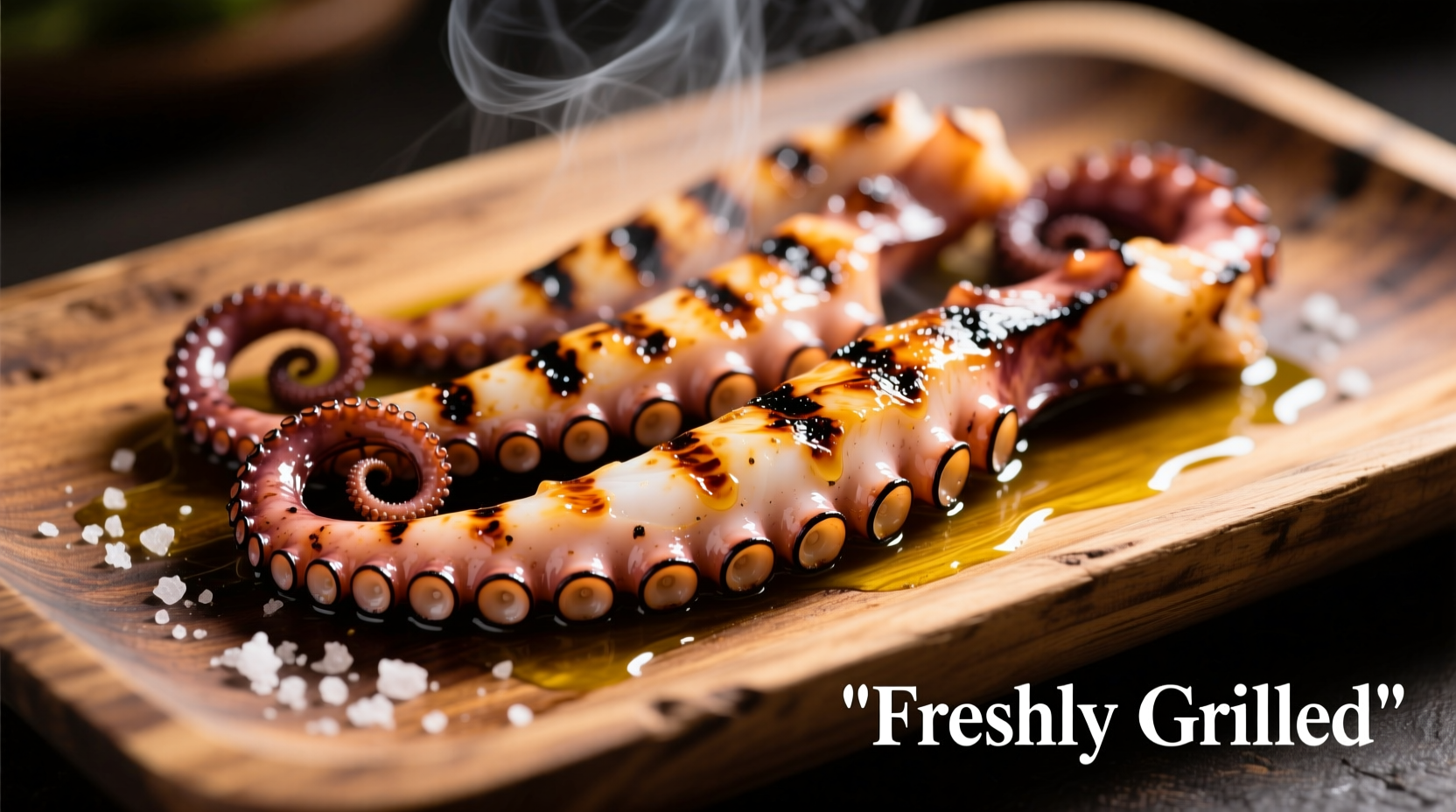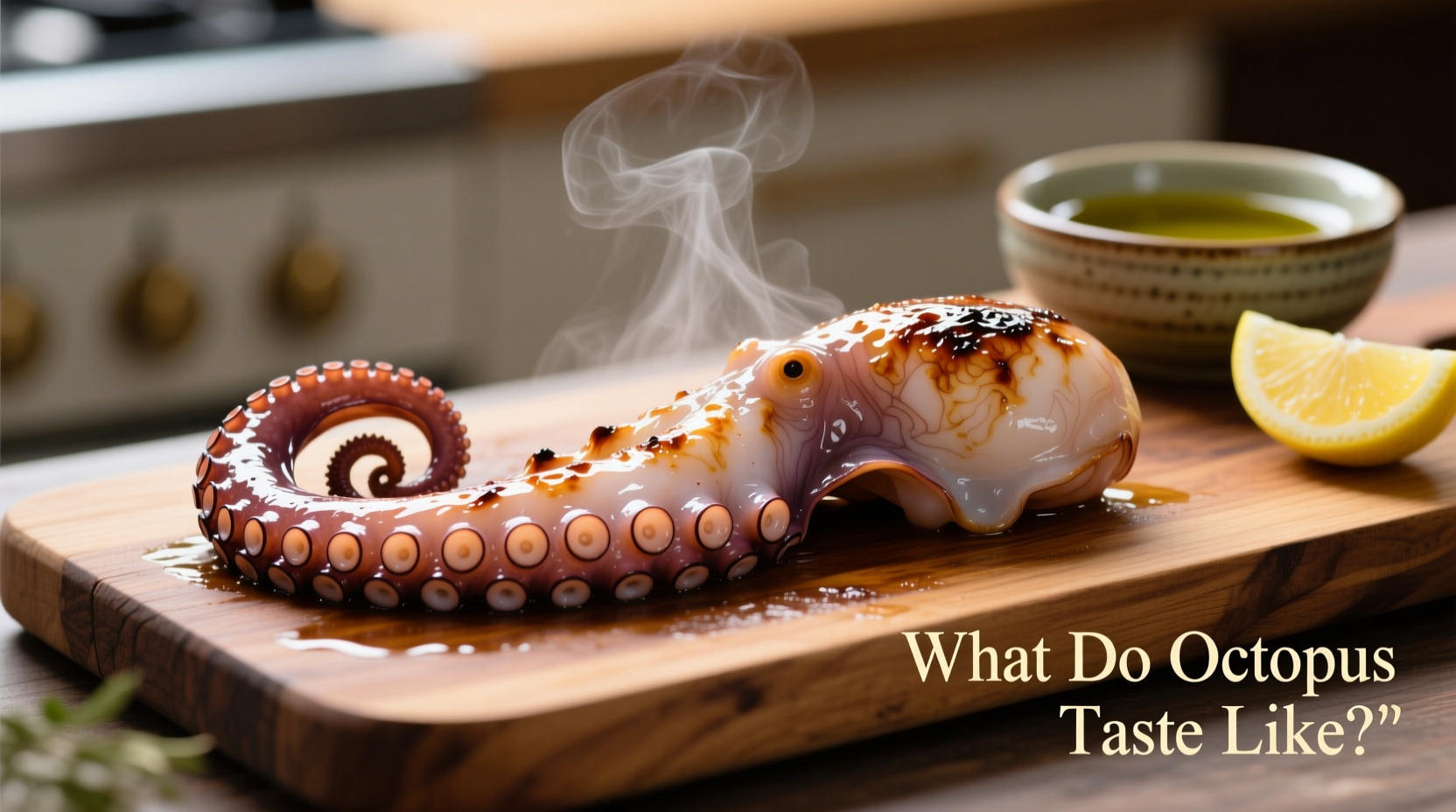Curious about trying octopus but unsure what to expect? You're not alone. Many seafood enthusiasts wonder what does octopus taste like before ordering it at a restaurant or attempting to cook it at home. This comprehensive guide breaks down the flavor profile, texture characteristics, and cooking variables that determine how octopus tastes across different preparations.
Your First Bite: Understanding Octopus Flavor Fundamentals
When properly prepared, octopus delivers a clean, oceanic taste without overwhelming fishiness. The flavor resembles a cross between lobster and scallops - subtly sweet with mineral notes from its marine environment. Unlike strongly flavored fish, octopus has a neutral base that readily absorbs marinades and seasonings, making it incredibly versatile in global cuisines.
According to the U.S. Food and Drug Administration's seafood nutrition guidelines, octopus contains natural umami compounds that enhance its savory profile. This explains why Mediterranean and Asian chefs often pair it with simple preparations that highlight rather than mask its inherent flavor.

Texture Transformation: From Rubbery to Tender
Many first-time eaters focus on what octopus tastes like, but texture plays an equally important role in the experience. Improperly cooked octopus becomes unpleasantly rubbery, while expert preparation yields a satisfying tender-chew that's firm but yielding.
The key to perfect texture lies in understanding collagen breakdown. Octopus contains significant collagen that requires either:
- Slow cooking (60-90 minutes at low temperatures) to convert collagen to gelatin
- Quick searing after proper tenderizing for a different textural experience
| Seafood Type | Flavor Profile | Texture Characteristics | Best Cooking Methods |
|---|---|---|---|
| Octopus | Mild, sweet, oceanic | Tender-chew when properly cooked | Slow braising, grilling after tenderizing |
| Squid/Calamari | More pronounced seafood flavor | Delicate when quick-cooked, rubbery if overcooked | Quick frying, stuffing and braising |
| Lobster | Richer, sweeter, buttery | Firm yet tender meat | Boiling, steaming, grilling |
| Clams | Briny, mineral-forward | Varies by cooking method | Steaming, in pasta sauces |
Cooking Method Impact: How Preparation Changes Taste
The question what does cooked octopus taste like depends significantly on preparation technique. Different culinary traditions have developed specific methods to optimize both flavor and texture:
Mediterranean Preparation (Spain, Greece, Italy)
Traditional Spanish "pulpo a la gallega" features octopus boiled with rock salt and paprika, then finished with olive oil and more paprika. This method preserves the natural sweetness while adding smoky depth. Greek preparation often includes boiling with bay leaves and serving with lemon-oregano dressing.
Asian Techniques (Japan, Korea)
In Japan, octopus (tako) is often served raw in sushi or quickly boiled for salads. Korean cuisine frequently features spicy marinated octopus (nakji bokkeum) where the clean flavor balances bold gochujang-based sauces. According to research from the Food and Agriculture Organization of the United Nations, Asian preparations often include brief vinegar treatments that enhance texture without overpowering the delicate flavor.
First-Time Eater's Guide: What to Expect
If you're wondering what does octopus taste like for beginners, here's what to anticipate:
- Initial impression: Clean ocean aroma without strong fishiness
- Flavor development: Mild sweetness with subtle mineral notes
- Texture: Tender with slight resistance (like al dente pasta)
- Aftertaste: Clean finish that doesn't linger unpleasantly
For those concerned about does octopus taste fishy, properly handled and fresh octopus should have minimal fishiness - more comparable to shellfish than oily fish. The key is freshness and proper cleaning, as off-flavors develop quickly in improperly stored cephalopods.
Avoiding Common Texture Mistakes
Understanding why is octopus rubbery sometimes helps prevent disappointing experiences. The texture issues stem from:
- Insufficient cooking time for collagen breakdown
- Rapid temperature changes during cooking
- Using improper tenderizing techniques
Professional chefs often employ a two-stage cooking process: slow simmering until tender, then chilling before final searing. This approach consistently delivers the ideal texture that makes what does octopus taste like a pleasant culinary experience rather than a chewy challenge.
Regional Flavor Variations Worth Trying
Your experience of what octopus tastes like varies dramatically by region:
- Greek grilled octopus: Simple preparation highlighting natural sweetness with lemon and olive oil
- Korean spicy octopus: Bold gochujang marinade balancing the mild octopus flavor
- Japanese tako sushi: Delicate raw preparation showcasing pure ocean flavor
- Portuguese grilled octopus: Smoky preparation with garlic and paprika
These regional differences demonstrate how the same ingredient transforms through cultural preparation techniques - answering the question does octopus taste different when prepared various ways with a definitive yes.
Practical Tips for Your First Octopus Experience
Ready to try octopus but unsure where to start? Consider these practical recommendations:
- Begin with Mediterranean preparations which showcase the natural flavor
- Ask about cooking method when ordering at restaurants
- Look for dishes specifying "tenderized" or "slow-cooked" octopus
- Pair with bright acidic elements like lemon that complement the flavor
- Avoid over-sauced preparations that mask the delicate taste
Understanding what does octopus taste like cooked helps set proper expectations. The flavor remains subtle regardless of preparation, serving as a canvas for complementary ingredients rather than a dominant flavor itself.
Debunking Common Octopus Myths
Several misconceptions persist about octopus flavor and texture:
- Myth: Octopus tastes strongly fishy Reality: Properly handled octopus has minimal fishiness, more comparable to shellfish
- Myth: All octopus is rubbery Reality: Correct preparation yields tender, enjoyable texture
- Myth: Octopus has a unique flavor unlike other seafood Reality: It shares flavor characteristics with lobster and clams
These clarifications help answer the fundamental question what do octopus taste like with accurate expectations rather than common misconceptions.











 浙公网安备
33010002000092号
浙公网安备
33010002000092号 浙B2-20120091-4
浙B2-20120091-4